Archaeology
Many people study the past to see what life was like before our time. Certain people, called archaeologists, study the past through looking at the remains of people and societies before us. There remains can be material goods, bodies, or even entire cities that were preserved in time. Read More...
◂Social Studies Worksheets and Study Guides Sixth Grade. Archaeology
Study Guide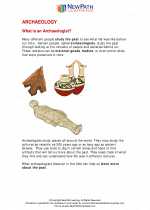 Archaeology
Archaeology  Worksheet/Answer key
Worksheet/Answer key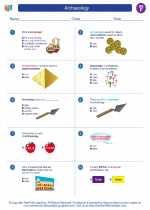 Archaeology
Archaeology  Worksheet/Answer key
Worksheet/Answer key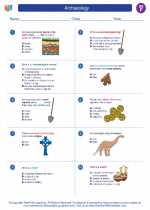 Archaeology
Archaeology  Worksheet/Answer key
Worksheet/Answer key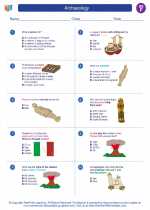 Archaeology
Archaeology  Worksheet/Answer key
Worksheet/Answer key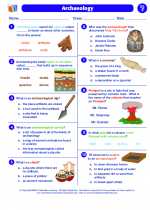 Archaeology
Archaeology 

 Worksheet/Answer key
Worksheet/Answer key
 Worksheet/Answer key
Worksheet/Answer key
 Worksheet/Answer key
Worksheet/Answer key
 Worksheet/Answer key
Worksheet/Answer key

The resources above cover the following skills:
National Curriculum Standards for Social Studies (NCSS)
TIME, CONTINUITY, AND CHANGE
SOCIAL STUDIES PROGRAMS SHOULD INCLUDE EXPERIENCES THAT PROVIDE FOR THE STUDY OF THE PAST AND ITS LEGACY.
KNOWLEDGE - Learners will understand:
The study of the past provides a representation of the history of communities, nations, and the world.
Concepts such as: chronology, causality, change, conflict, complexity, multiple perspectives, primary and secondary sources, and cause and effect.
That learning about the past requires the interpretation of sources, and that using varied sources provides the potential for a more balanced interpretive record of the past.
That historical interpretations of the same event may differ on the basis of such factors as conflicting evidence from varied sources, national or cultural perspectives, and the point of view of the researcher.
Key historical periods and patterns of change within and across cultures (e.g., the rise and fall of ancient civilizations, the development of technology, the rise of modern nation-states, and the establishment and breakdown of colonial systems).
The contributions of key persons, groups, and events from the past and their influence on the present.
The influences of social, geographic, economic, and cultural factors an the history of local areas, states, nations, and the world.
National Center for History in Schools (NCHS)
Historical Thinking Standards
Chronological Thinking
Identify the temporal structure of a historical narrative or story.
Interpret data presented in time lines and create time lines.
Reconstruct patterns of historical succession and duration; explain historical continuity and change.
Compare alternative models for periodization.
Historical Comprehension
Reconstruct the literal meaning of a historical passage.
Identify the central question(s) the historical narrative addresses.
Historical Analysis and Interpretation
Draw comparisons across eras and regions in order to define enduring issues.
Challenge arguments of historical inevitability.
Hold interpretations of history as tentative.
Historical Research Capabilities
Formulate historical questions.
Historical Issues-Analysis and Decision-Making
Identify issues and problems in the past.
Identify relevant historical antecedents.
World History Content Standards
Era 2: Early Civilizations and the Emergence of Pastoral Peoples, 4000-1000 BCE
The major characteristics of civilization and how civilizations emerged in Mesopotamia, Egypt, and the Indus valley.
The student understands how Mesopotamia, Egypt, and the Indus valley became centers of dense population, urbanization, and cultural innovation in the fourth and third millennia BCE.
The student understands how commercial and cultural interactions contributed to change in the Tigris-Euphrates, Indus, and Nile regions.
How agrarian societies spread and new states emerged in the third and second millennia BCE.
The student understands how new centers of agrarian society arose in the third and second millennia BCE.
The political, social, and cultural consequences of population movements and militarization in Eurasia in the second millennium BCE.
The student understands the social and cultural effects that militarization and the emergence of new kingdoms had on peoples of Southwest Asia and Egypt in the second millennium BCE.
Major trends in Eurasia and Africa from 4000-1000 BCE.
The student understands major trends in Eurasia and Africa from 4000 to 1000 BCE.
Era 3: Classical Traditions, Major Religions, and Giant Empires, 1000 BCE-300 CE
Innovation and change from 1000-600 BCE horses, ships, iron, and monotheistic faith.
The student understands how states developed in the upper Nile valley and Red Sea region and how iron technology contributed to the expansion of agricultural societies in Sub-Saharan Africa.